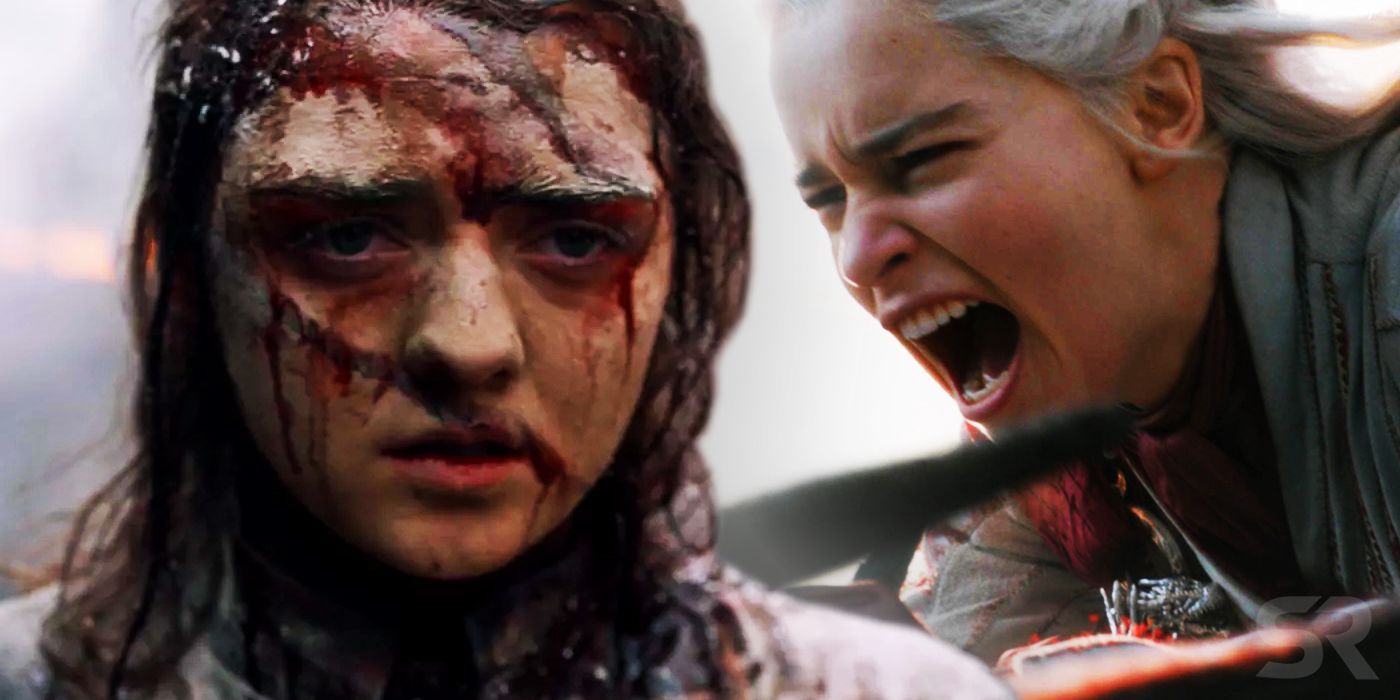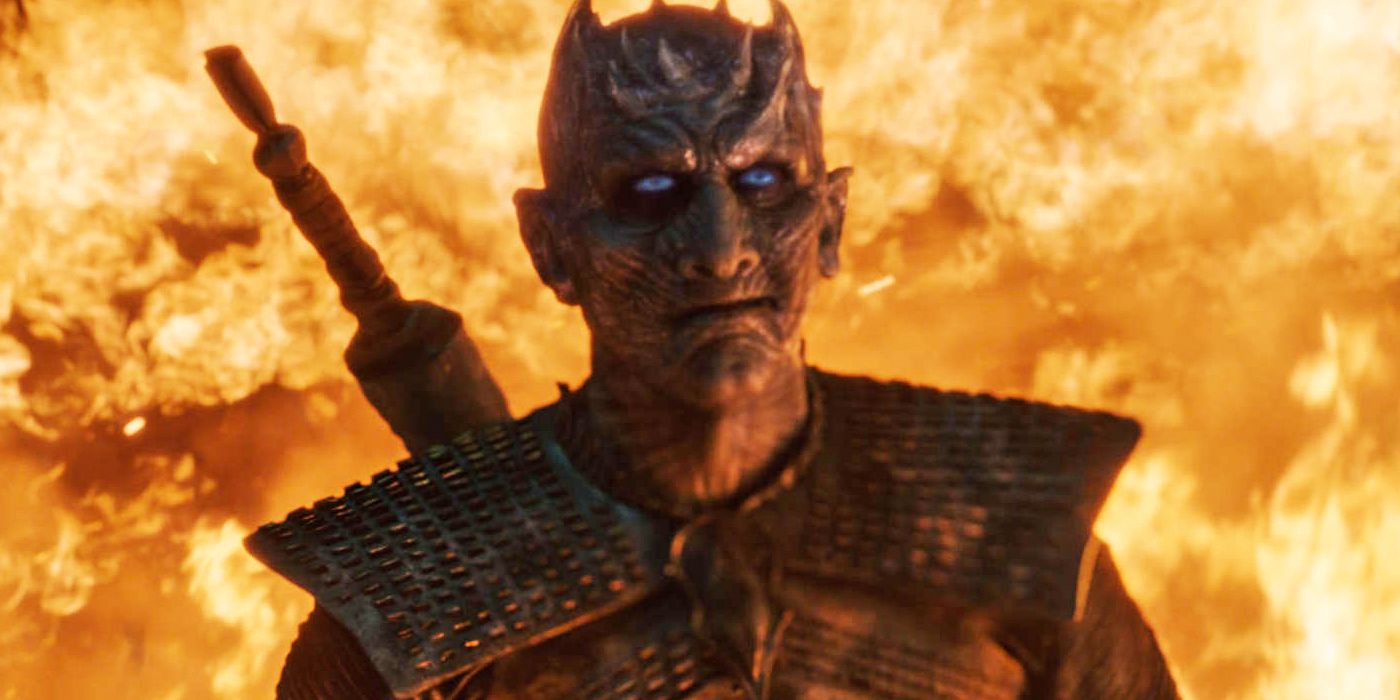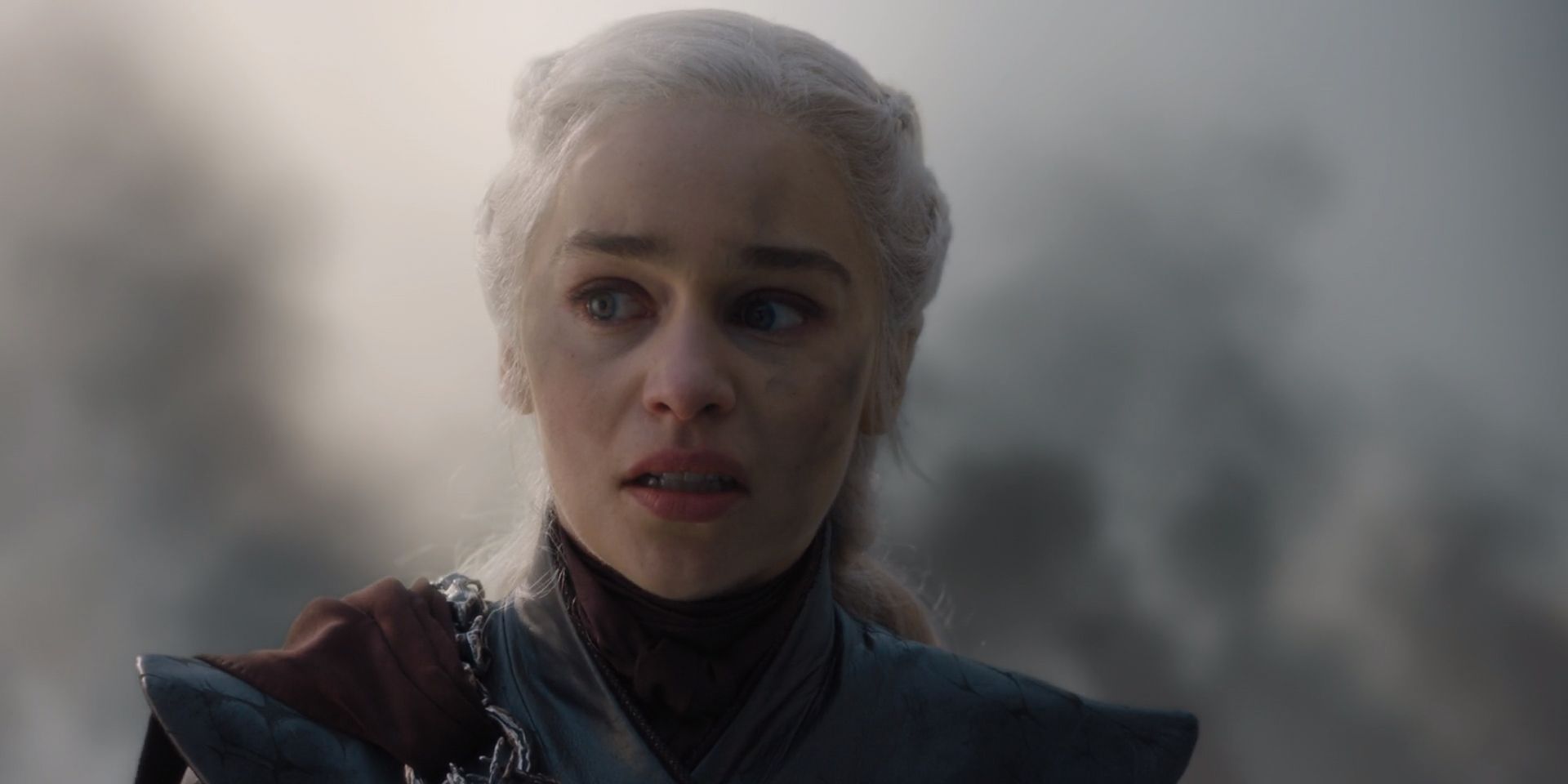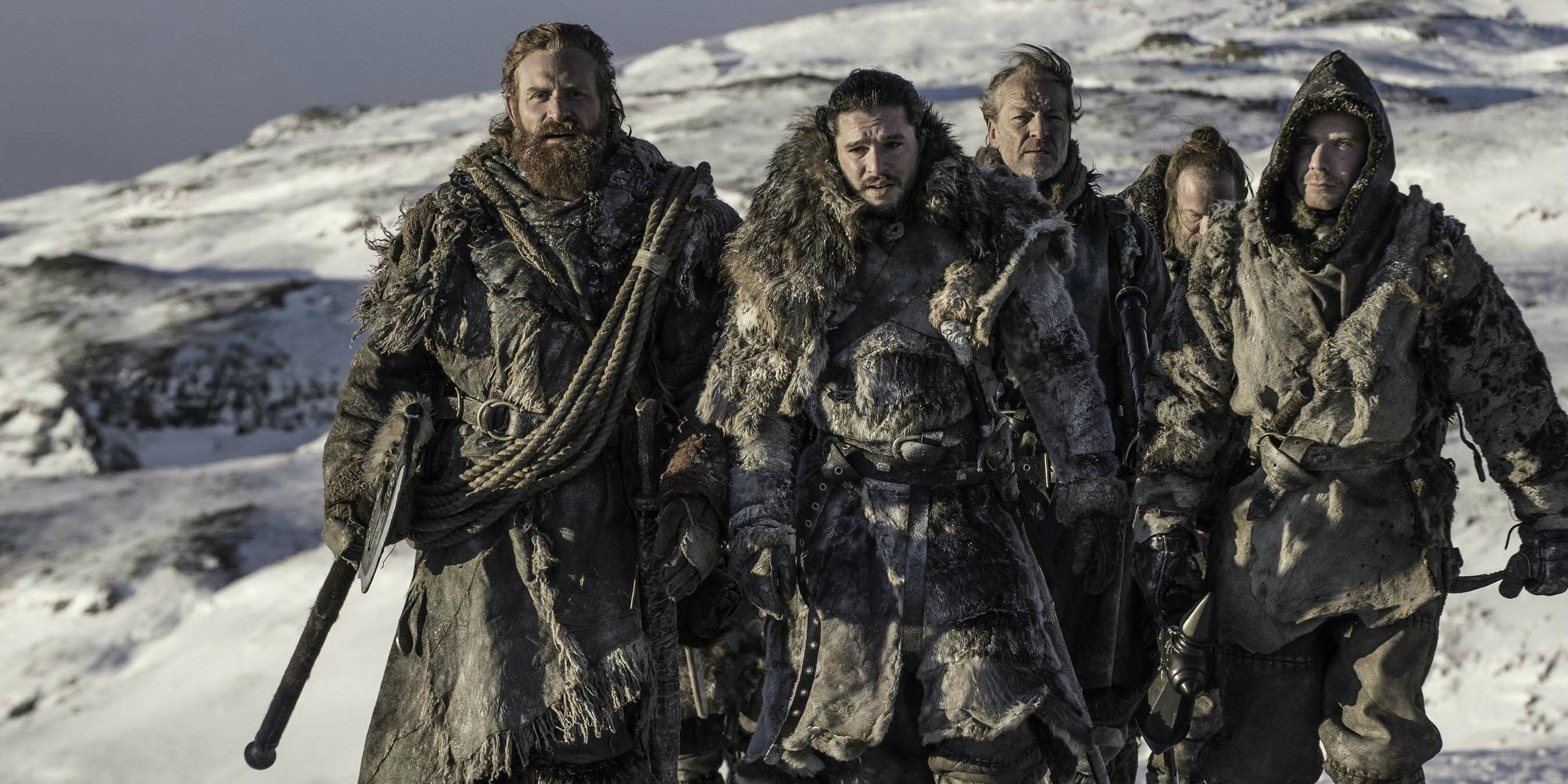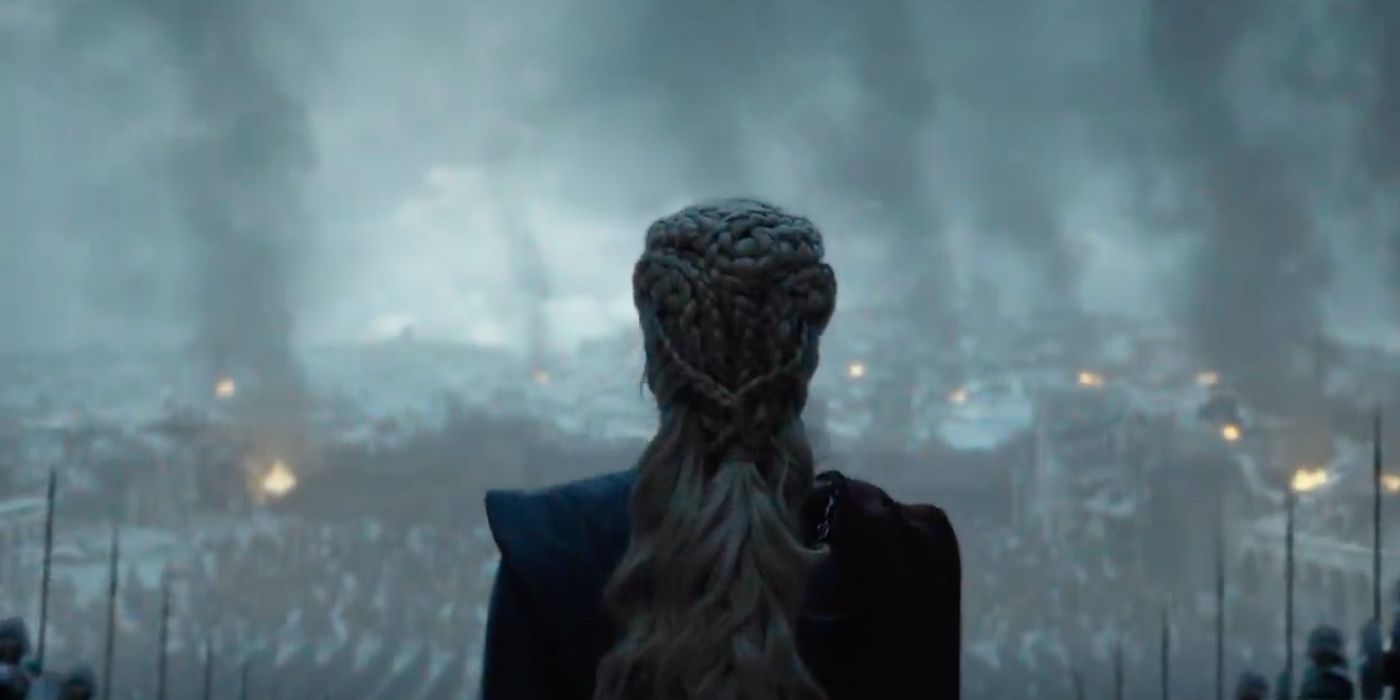Game of Thrones season 8 has proven to be the most controversial in the show's history, but an excellent episode 5, titled "The Bells", highlights how many of the divisive elements aren't a result of anything that's happening in the show now. Rather, fitting of a series where the sins of the past define the present, it's all about mistakes made years ago.
The ending was always going to be a big challenge for Game of Thrones. Showrunners David Benioff and D.B Weiss had a pre-defined endpoint for the story at the very start, yet it was only ever in vague terms due to the source books not being complete; and, as it became clear the show would overtake George R.R. Martin, there was a handover in authorship. But the nature of Game of Thrones made concluding even trickier. With the death of Ned Stark in season 1 and the Red Wedding two years later, it had marked itself out as one of the most unpredictable and unrestrained narratives on TV, yet as decades of theorizing came to a head and the story began to adjust perspective to reveal something more conventional, expectations and reality became dissonant.
With such a high bar and many ways to trip, it shouldn't be surprising that the mood surrounding Game of Thrones' final season is one of disappointment. There are simply too many unmovable factors that make it being coherent with what the show was in 2011 - and what the books were in 1996 - impossible. But the situation we have now is even more complicated because the so-called problems with Game of Thrones season 8 aren't really the product of season 8 itself; they're issues that have been bubbling under the surface for years.
Game Of Thrones Season 8 Is Too Short & Moved Too Fast
Game of Thrones has always been a carefully plotted story, but also dense ones. The A Song Of Ice & Fire books are mammoth tomes, the last two of which had to split into two separate volumes, and in the early years the show took a similar approach to its storytelling. It was wheel spinning, but that's where the drama was.
Now, though, Game of Thrones functions on fast-forward. Just try and comprehend season 8 and its story events. The premiere and episode 2 were scene setters for The Great War To Come, establishing who was at Winterfell and paying off more esoteric character threads. Then episode 3 was the entire Long Night up to and include the Night King's defeat, meaning in three episodes, the major overarching story of the show since its very first scene was resolved.
Episode 4, "The Last of the Starks", was basically a half-season's worth of plot in a fraction of the time; starting with Dany saying goodbye to Jorah and ending on Missandei's call for "dracarys" may have given it some sense of symmetry, but the amount of ground covered (literally considering the journey to King's Landing was a major barrier for relations in season 1) is stark. Episode 5, "The Bells" was certainly the most balanced in terms of how singularly focused it was on telling the Battle of King's Landing, but there was still a lot to get through before arriving there, and some rather jolting character turns once it did.
This isn't just aggressive pacing, it's actively hurting the story. Gauging the supposed importance of events is difficult - the White Walker defeat is given less time than Jaime drunkenly knighting Brienne - big moments come across as silly - the explanation for why Rhaegal the dragon died has become a meme - and means there's little room for lasting character changes; you either have key players stuck in stasis due to everything around them moving to fast, or making sudden swerves because there wasn't time to establish it.
In 350 minutes - the equivalent of seven standard near-hour episodes - Game of Thrones season 8 has dealt with two major story areas, tying up dozens of threads as it went. Put alongside early years, the beginning of season 8 to end of episode 5 is similar in conceptual scale to the show's premiere to the end of the Battle of the Five Kings (so the end of season 3, give or take), but in a quarter of the time. That's not the difference between nuanced and fumbled, it's an entirely different way of telling a story.
Game Of Thrones Season 8's Biggest Ideas Weren't Set Up Clearly
Where you can see how damaging speed can be to the telling when honing in on Game of Thrones season 8's more controversial elements: Arya killing the Night King; and Daenerys becoming a Mad Queen and razing King's Landing.
What should be immediately striking about both is how they're very much within the realms of character logic. This has surely always been a natural endpoint for Daenerys, whose claim to the Iron Throne and thus entire arc is put into question the moment Jon Snow is confirmed as a Targareyan; episode 5's "Previously On" may have overleaned on teases of her genetic madness, but it's hardly something that breaks the logic of her story, and is likely pure George R.R. Martin.
Arya Stark's killing of blue eyes is a little different. There's no Night King in the books and he wasn't introduced until season 3 of the show, so it's hardly a baked-in concept. Indeed, while the writers have said they've known for three years Arya would be the one to end the White Walkers, considering Game of Thrones' protracted production that's as recently as when season 6 was airing; any use of "what do we say to the God of Death?" or "blue eyes" as supposed setup is a retcon. Still, that nevertheless means for one-and-a-half full seasons, the writers knew where Arya's destiny lied, and there were teases of that.
The problem in both cases, though, is that while the intention was there, it wasn't conveyed properly to the audience. Arya became a faceless assassin and Daenerys went a touch too far at points, but in seasons 7 & 8, the teases of their grand fates were so vague - Arya's link to Beric's continued survival wasn't mentioned until after he died, worries over Dany's mental state weren't fully reflected in her characterization until episode 5 - that they could be mistaken for flavor, not direction.
In contrast, look at Jon Snow being a Targaryen. Game of Thrones never broke its back hiding that Jon Snow wasn't Ned's son. There are multiple nods towards the truth throughout the early seasons and repeated returns to discussing the Tourney at Harrenhal and Rhaegar's altruism nudged viewers subtly of its possibility. In the books it was even more extreme, with Ned haunted by dreams of an unknown promise to Lyanna on her deathbed; when fans figured it out, Martin was tempted to change Jon's parentage, but realized that story strength was more important that surprise.
And that's where the issues with Game of Thrones season 8's contentious moments come from. It's not that they don't make sense, it's that the writers have prioritized shock over logic (similar to Westworld, another prestige HBO genre series that had fans guess all its secret in season 1 so became an impenetrable bore in its sophomore year). This would never have happened previously because Benioff and Weiss were using the books as a roadmap, teases and all (something that also kept the fandom divided in focus), but since the overtake they leaned into surprise as a key storytelling factor.
Game Of Thrones' Major Mistakes Were Made In Season 7
If the accepted problems with Game of Thrones season 8 are that it's rushing and that major plot turns aren't set up, then it's impossible to say this is a new wrinkle in anyway localized to this final run of six episodes. In fact, it's all rooted in the vastly inferior season 7, and the decisions that made this the ending point in the first place.
It was in July 2016, around the airing of season 6, that HBO confirmed Game of Thrones would be ending with season 8. It would, after much speculation, be revealed these final two seasons would be shorter in episode number (albeit with potentially longer runtimes) to better focus the show's already-high budget. Subsequently, it became clear these restrictions - to wrap up the story in 13 episodes as part of two season blocks - were a direct product of the showrunners.
What doesn't seem to have been pushed is a clear story direction. Like many shows that gained a clear end date yet would hold back the true purpose of that ending until much later (see Lost, which confirmed season 6 as the last during season 3 yet was still laying down fundamental mythology three episodes from the finale), Game of Thrones continued either aimless or distracted, and obsessed with the macro. The penultimate season was acting like it was moving pieces into position, but in actuality, it was merely clearing the decks and treading water in random directions before the payoff to come.
What does the entire "Beyond the Wall" fiasco - where Jon Snow's Suicide Squad try to steal a wight to convince Queen Cersei to help them - do for the bigger plot? Aside from giving the Night King an ice dragon to knock down the wall - a logic hole the show still hasn't addressed - it's a lesson in futility; Cersei didn't need to see the zombie to decide to not help, neither did Jaime to go try and do the right thing. Three episodes out of a final thirteen - that's about 20% of the remaining story, accounting for total runtime - were devoted to an isolated and illogical plot. That's not to say every moment of screentime should be slavishly obsessed with the big picture, but to construct a narrative with so much that's inconsequential is poor.
This plot inefficiency plagues Game of Thrones season 7 and early season 8. Despite season 6's finale revealing that Jon Snow is the son of Lyanna Stark and (presumably) Rhaegar Targaryen, there was still a three-episode run - from season 7's finale to season 8, episode 2 - where each hour ended re-explaining that fact to different characters, just in case the audience wasn't caught up.
Clearly there was a decision made to have both the Battles of Winterfell and King's Landing in season 8 which limited the story movability of season 7, but that shouldn't get in the way of how lackluster the supposed setup proved to be.
Game Of Thrones Season 8 May Still Have A Great Ending
Fixing Game of Thrones season 8 to be as great as what the show promised in its mid-years would need more than just altering the flow of the final six episodes. It would require reshaping the entire series from the moment an ending was decided (in narrative terms, the moment that Cersei took power in King's Landing). An ideal situation would be three full, ten-episode seasons: season 7 covering Daenerys' initial conquest in Westeros, season 8 The Long Night, and season 9 The Last War. That may be a little too rigid structurally and means the White Walkers are finished a whole season before the show ends, but it would allow each step of the journey to breathe, as well as a return of natural and impactful character development.
But that's a "what if" rooted in corporate moves made years ago. Looking at what we have, is there still hope? Could this be a case where the ends just about justify the means? Quite possibly.
Game of Thrones season 8, episode 5 was great in spite of everything that had happened to get there. The Mad Queen turn for Daenerys may have proven too sudden for some, but taken as a singular piece of storytelling, where she is at the start and end of the episode has a pretty clear line. In amongst unsettlingly grounded action (Miguel Sapochnik has elevated everything Westerosi he's touched), there was also strong character always shining through: the silly bombast of Cleganebowl gave the Hound a fitting ending; having Cersei die with - not at the hands of - Jaime was deft subversion of expectations; and Maisie Williams' justifies Arya being a clear writer favorite.
And you should have hoped for that to be the case. Even as the journey there has been muddled, this is the ending that Game of Thrones has been building to and all those season 7 decisions were made in service of. They did have an ending in mind, it was the getting there where there were issues. If "The Bells" can land as a good episode, then surely the series finale has a similar hope of rounding everything off in a satisfying manner. That's not to say it will justify the mistakes made along the way - and there's no way that rushing to the endpoint won't hurt the payoff of certain ideas - but there's a good chance that the core ideas will get their suitable completion. And if it doesn't, then the Game of Thrones ending's root problems are deeper than one extended hour of television.
Game of Thrones season 8 concludes this Sunday on HBO at 9pm.

